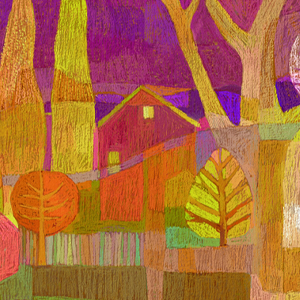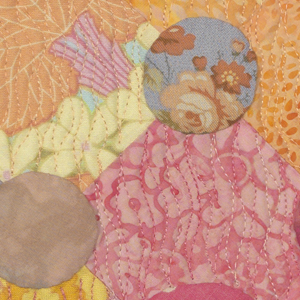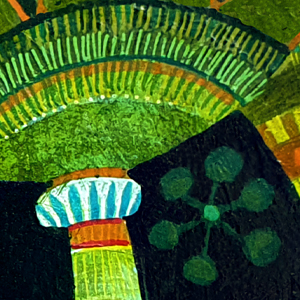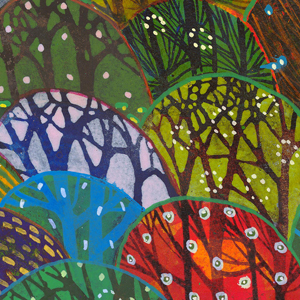
Defining Virtue
Liberal Education, Intellectual Play, and the Virtues of Civil Discourse
Jed W. Atkins
Artwork: “Summer Sprinkles” by Timna Tarr © 2011
Earlier this Fall, the University of North Carolina at Chapel Hill included in its first-year orientation activities a session on the freedom of expression and civil discourse. Co-sponsored by the offices of the Provost, Student Affairs, and the School of Civic Life and Leadership (SCiLL), SCiLL faculty introduced 130 students to the principles of freedom of expression and their history at Carolina, and gave them practice in the charitable disagreement about ideas that are hallmarks of a university education.1 A post-orientation survey revealed that students’ desire to participate in civil discourse far surpassed their confidence in their abilities to engage in such conversations.
This should not surprise. Learning to engage in reasoned, free, and civil conversations about important political, moral, and religious ideas requires practice, and students are not arriving at universities with the knowledge, experience, or habits of heart and mind required to have such conversations. Increasingly, universities must provide the institutional support necessary for students to engage fully in the search for truth and the discovery of knowledge that constitute its primary purposes.
Post-secondary institutions come in a variety of shapes and sizes. As I have learned through listening to the experiences of faculty at 70 diverse colleges and universities in the Duke Teaching Civil Discourse in the Classroom Summer Faculty Seminar the past three summers, the obstacles to civil discourse in the classroom vary among institutions. For the institutions in which I have worked, a private research university and a flagship state university, three obstacles to civil discourse are especially prominent.
First, critics argue that civil discourse, by imposing limits on speech in the name of civility, excludes the viewpoints of minority groups.2 Some of these scholars argue that in majority-white countries, such as the United States, calls for civil discourse have been used to perpetuate white supremacy by enforcing norms of “politeness” that exclude minority voices.3 Other critics contend that civil discourse is too inclusive. In the view of Sigal Ben-Porath, “the bar of civility is set too low in that it allows noxious ideas free rein as long as they are voiced in proper and decorous ways.”4
However, civil discourse is not synonymous with polite speech. The word “civil” comes from the Latin, civilis. Civilis means civic, public, or political. Derived from the same root as “citizen,” speech that is civilis is that which affects or pertains to other citizens. Civil discourse is speech addressed to fellow citizens as shared members of a common community. It entails a commitment to working out our differences with words, not violence. As Cicero memorably wrote, “there are two ways of contending: one proceeds by discussion, the other by force.”5 My former Duke colleague Deondra Rose prefers the term “civic discourse” to stress that “civil speech” does not necessarily require “polite speech.”6
Civil discourse as speech between citizens underscores why universities are well-suited as training grounds of democratic speech. Universities are large, complex, and diverse institutions, but not nearly as large, complex, and diverse as a nation such as the United States. In a large republic, it can be difficult for me, as a North Carolinian, to imagine myself engaging in a common enterprise with a Californian. The university provides its members with different forums offering different types of speech depending on their specific ends and goods. For instance, in the classroom students participate as community members possessing a common good—the search for truth or the discovery of knowledge; in student government, students deliberate about school policies; in other common campus spaces, students recruit for their organizations, demonstrate, attend and speak on panels, and much more. In offering these and other forums, universities direct speech to different and more specific goods than the civil discourse about the good of the nation. Still, speech that seeks truth among a plurality of opinions in the smaller classroom community—the forum I will be focusing on here—can have the salutary byproduct of training students to engage in civil discourse with their fellow citizens in the broader civic community. By learning to speak as members of the smaller classroom community, students develop capacities and gain knowledge useful for participating in the larger communities of state and nation.
The other two obstacles to civil discourse are interconnected. One is the pre-professionalism lamented by William Deresiewicz in his book Excellent Sheep.7 Deresiewicz argues that students at our elite institutions are high-functioning sheep, cultivated for professional success from an early age. Shepherded along the tried-and-true path of achievement by well-intentioned elders, such students fear the failure and risk that may come from straying from the flock. Speaking and writing freely in pursuit of truth—the hallmark of a traditional liberal education—has always been risky; after all, you will be asked to analyze your most cherished beliefs. For pre-professional strivers, the normal risks are compounded by the fact that by virtue of social media and smartphones, anything you may say inside or outside of the classroom risks being recorded and reported to future employers. No surprise that for many students the risk is not worth it.
Civil discourse-thwarting risk aversion also takes the form of what Jonathan Haidt and Greg Lukianoff call “safetyism.” Haidt and Lukianoff note how concern for promoting children’s safety has extended from physical to emotional harm. By the early 2000s, trauma increasingly came to refer to the subjective, internal, individual state in which one experiences words or actions as physically or emotionally harmful. Psychologized and applied to speech, this protective mentality against “harm” has led to the restrictions and even punishment of speech in the name of campus safety, especially for the vulnerable and marginalized.8 This focus on fragility has denied humanity’s anti-fragile nature.9
The challenges of pre-professionalism and safetyism force educators to search for more robust supports for the practice of civil discourse in the classroom. I suggest that considering these pressures, the Ciceronian civic dimension of membership in a common community bound by a shared commitment to discussion rather than violence finds support in the Platonic understanding of education as the playful search for the highest truths about the human condition and our world.10
Plato’s discussion of intellectual play shows that its proper objects are the most serious matters of human investigation that would become the backbone of a liberal education: the good political community and society, the human person, the gods and transcendence, and the cosmos and natural world. The intellectual play of liberal education has its own goal—seeking the truth—which directs play’s end and transforms it into a morally serious enterprise: the search for truth is among the highest human goods. While it may have other benefits (such as making one a more interesting person, a wiser, more informed citizen, a better employee, or more adept at civil discourse), the pursuit of truth by intellectual play is worthwhile for its own sake. It shares this auto-telic nature with other forms of play11—perhaps these even include worship, which Robert Bellah argued is a form of play that seeks communion with the Divine as an end-in-itself.12
Those who participate in intellectual play about serious matters are aided by virtues. One of these virtues includes the courage to take risks by holding up for consideration new ideas, thereby allowing that they may have a claim on you;13 another is the humility to recognize that you are not intellectually self-sufficient and can learn and grow from others. Inasmuch as you seek the truth in an intellectual community, such as the classroom, you need to trust others with the vulnerability and neediness you invite by pursuing truth, an act which follows from the recognition that you are not complete in yourself. This trust strengthens the shared bonds of humanity, cultivated by the intellectual hospitality of making space for those who think differently from you. So too intellectual play involves patience and charity in light of the mutual recognition of our common weaknesses and hospitality that welcomes the fellow truth-seeker.
One can better see the structure of intellectual play and how it facilitates civil discourse as a byproduct of truth-seeking by comparing it to another form of play especially prominent in the Durham-Chapel Hill area: basketball. I actively draw on the metaphor of basketball to describe to students what we are trying to achieve through our intellectual play in the classroom. As with any metaphor, there are disanalogies: the truth-seeking of intellectual play is a non-zero-sum ongoing process, whereas basketball games have clear endings and winners and losers. Still, the metaphor illuminates several benefits of seeing civil discourse as flowing from intellectual play.
College students, typically so inexperienced in the sort of civil discourse that characterizes intellectual play, cannot expect to possess the relevant virtues straight off. As in youth basketball, we can expect awkwardness at first. Just as beginning basketball players may miss an easy fast-break lay-up, so students in class discussion may express themselves inelegantly or in confused, muddled, or offensive ways. They will display ignorance of facts, history, religion, science, and moral and political arguments. Professors must be patient with students, and students must extend that same patience to one another. We are all learning and growing. We are not now what we will become, and we will hardly grow intellectually without subjecting our views to scrutiny. Just as youth players may take selfish and ill-advised shots or fail to take good shots when given the opportunity, so in the classroom game of civil discourse students may alternate between being overly argumentative (thus robbing themselves of the opportunity to learn from others) or they may too frequently self-censor (thus robbing others from learning from them).
As patience must be extended to individuals in civil discourse, so too charity. Just as at an early season practice, teammates may miscommunicate and throw the ball out-of-bounds, so in our conversations we may miscommunicate and misunderstand one another. That is to be expected and is part of learning to play with ideas. Over the course of a semester students will grow in their trust of one another and ability to communicate just as a basketball team will improve in these areas over the course of a season. This collective growth will not take place if we do not extend the charity of taking others’ arguments at their strongest (sometimes called “the principle of charity”) and attribute the best motives to the speech of conversation partners.
Skillful civil discourse, just like basketball, requires knowledge of one’s interlocutors. Just as basketball teams hang-out off the court to build strong culture, so classmates and professors need to have opportunities to get to know one another inside and outside the classroom: I have come to think that conversations outside of the classroom are especially important due to the depth of the cultural challenges to civil discourse. Shared meals with classroom speakers of diverse perspectives enable students to carry on an intellectual conversation via the shared humanity of a common meal. The hospitality of sharing a meal reinforces the intellectual hospitality of sharing an intellectual conversation.
The metaphor of basketball to describe the classroom activity as intellectual play also helps students to prepare to navigate some of the trickier aspects of classroom conversation involving inclusion, equality, and the charge that civil discourse may lead to harm. Play requires an element of reciprocity and equality, even among those who are in some respects unequal. In Religion in Human Evolution, Robert Bellah observes how when wild animals play, even those naturally dominant partners will restrain themselves to allow for a degree of reciprocity and mutuality.14 A classroom conversation that practices civil discourse, one that aims at “truth not victory,” will similarly admit of reciprocity. Students will not seek to dominate the conversation and their classmates but will aim to enable all to speak fully, freely, and strongly. Freedom is a gift that students must give to one another.
Moreover, the basketball metaphor helps ground claims of “trauma” and “harm” in some degree of objective, common experience while also recognizing that there are powerful subjective aspects to these experiences, which should not be entirely dismissed. As in basketball, so in the classroom I deny neither that past injuries can impact one’s ability to participate nor suggest that words cannot injure. Anyone who has been bullied knows that words can wound and can cause long-lasting pain. There is no place in civil classroom discourse for bullying, from which civil discourse is readily distinguished,15 and surely professors need to be aware of how present dynamics in the classroom may make speech difficult for past victims of bullying. I see nothing wrong with allowing students who have suffered a painful, even traumatic, event related to the topic of discussion to be able to “sit out” of the classroom session, if after reflection they are not able to engage—just as basketball players at times need to sit out a half or a game.
But at the same time and on the same analogy, the student who sits out the class does not demand that the discussion be shut down for others. The game must go on. Moreover, as in basketball, so in the classroom discussion when one is dealing with an injury, it is not healthy to avoid discussing the related event for the rest of one’s life. The goal is to rehab with a trained professional—a trainer in basketball or perhaps a therapist for difficult life events—to overcome the injury and get back in the game. I have witnessed how my students have learned to cope with hardship by discussing texts on death and suffering by religious and philosophical thinkers in a community of intellectual friends. Participating in intellectual play can move students to develop the convictions needed to live courageously in the world in their personal and civic lives.
Indeed, the liberal enterprise of intellectual play has a distinctively civic benefit. For many years UNC Professor of the Practice John Rose taught at Duke a highly successful course that stresses promoting the intellectual virtues to tackle political polarization and the crisis of civility. One student arrived in the class feeling alone, isolated, and angry because of mistreatment at the hands of other students for her political beliefs. In the class she and her classmates discussed issues such as transgender sports, abortion, pronouns, and race in a welcoming environment in which “no one was ostracized, everyone shared, and everyone listened.”
Meeting and interacting with my fellow students gave me a hope I had never had before for the future of our country. . . . More than that, however, I realized that courage is a virtue that is critical to the future of our nation. Seeking the truth is vital and seeking the truth takes courage. It takes asking questions, and it takes being uncomfortable. It also takes courage to stand strong in your beliefs. It takes courage to be gracious with those with whom you disagree, and courage to have the humility to admit when you are wrong. Our world needs more people of courage, and I am honored to have been in a classroom among those with genuine courage, humility, and grace.
If universities are going to produce citizens who can disagree well, they should aim above all to promote a liberal education that invites students to risk playing with the most important ideas as they seek the truth about themselves and their world. Universities must equip students to “play gracefully with ideas,” as Oscar Wilde once described the benefits of an Oxford Education in De profundis. Such an education, pursued for its own sake, has the resources to combat the pre-professionalism, safetyism, and fragility that currently hinder our universities from producing the reflective citizens our polarized country so desperately needs.
Notes
-
- Christa Dutton, “Can You Teach Free Speech? These Colleges Are Trying,” The Chronicle of Higher Education, September 3, 2024, chronicle.com/article/can-you-teach-free-speech-these-colleges-are-trying.
- Sigal R. Ben-Porath, Cancel Wars: How Universities Can Foster Free Speech, Promote Inclusion, and Renew Democracy (Chicago: The University of Chicago Press, 2023), 83–84.
- Alex Zamalin, Against Civility: The Hidden Racism in Our Obsession with Civility (Boston: Beacon Press Books, 2021).
- Ben-Porath, Cancel Wars, p. 84. Ben-Porath believes that civil discourse commits both the errors of being too exclusive and too inclusive.
- Cicero, On Duties 1.34.
- Scott Huler, “Showing Up for Democracy,” Duke Magazine, June 10, 2024. dukemag.duke.edu/stories/showing-democracy
- William Deresiewicz, Excellent Sheep (New York: Free Press, 2014).
- Jonathan Haidt and Greg Lukianoff, The Coddling of the American Mind (New York: Penguin, 2018), pp. 37–40.
- Nassim Nicholas Taleb, Antifragile: Things that Gain from Disorder. (New York: Random House, 2014).
- Plato, Laws 7.803. Cf. J. Huizinga, Homo Ludens (Mansfield: Martino, 2014), p. 19.
- Bernard Suits, The Grasshopper: Games, Life, and Utopia, 3rd ed. (Peterborough: Broadview Press, 2005).
- Robert Bellah, Religion in Human Evolution (Harvard: Belknap, 2011).
- For risk in play, see Huizinga, Homo Ludens, p. 47.
- Bellah, Religion in Human Evolution, p. 81.
- See Robert P. George, “On Critics and Bullies,” July 1, 2020, heterodoxacademy.org/blog/viewpoint-diversity-critics-bullies
 Jed W. Atkins is the inaugural director and dean of the School of Civic Life and Leadership at the University of North Carolina at Chapel Hill. He is the author of several books including the recently published, The Christian Origins of Tolerance.
Jed W. Atkins is the inaugural director and dean of the School of Civic Life and Leadership at the University of North Carolina at Chapel Hill. He is the author of several books including the recently published, The Christian Origins of Tolerance.
Spring 2025
Part I: Defining Virtue
James Arthur
Dayna L. Cunningham
Greg Lukianoff
Najeeba Syeed
Interlude: Defining Moments
Part II: Defining Vocation
MORE
















